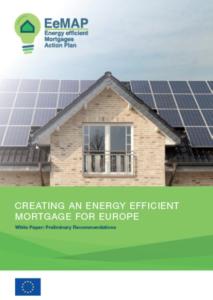 Energy efficient mortgages could play a central role in Europe’s new strategy for sustainable finance, states a White Paper published today under the EU funded ‘Energy Efficient Mortgages Action Plan’ Initiative – which sets out key recommendations towards the creation of an energy efficient mortgage product for Europe.
Energy efficient mortgages could play a central role in Europe’s new strategy for sustainable finance, states a White Paper published today under the EU funded ‘Energy Efficient Mortgages Action Plan’ Initiative – which sets out key recommendations towards the creation of an energy efficient mortgage product for Europe.
With further details on the EU’s plans to integrate sustainability considerations into financial policy expected later this year, the EeMAP White Paper sets out the technical actions needed to ensure mortgage lending can support the EU’s climate and building renovation goals. It also puts forward technical recommendations in order to begin collecting energy efficiency loan data to ensure financial regulators recognise the potential risk mitigation of home energy efficiency. The idea is that lower risk on the balance sheet of banks should qualify for lower capital requirements, delivering a strong incentive for banks to enter the market.
The recommendations in the White Paper build on four EeMAP research reports also published today, which show how energy efficient mortgages could work by examining current market practices within the areas of green finance, building performance indicators, property valuation and the impact of energy efficiency on risk.
The reports aim to demonstrate the feasibility and benefits of banks financing energy efficiency improvements of the EU’s building stock, which is responsible for over a third of the EU’s carbon emissions. As mortgages account for around a third of the total assets of the European banking sector – equivalent to half of the EU’s GDP (EUR 7 trillion at the end 2016) – banks can play a leadership role in the EU’s ambitious climate and energy goals if mortgage lending recognises and rewards better energy performance.
The EeMAP Initiative – led by the European Mortgage Federation-European Covered Bond Council, Ca’ Foscari University of Venice, RICS, the Europe Regional Network of the World Green Building Council, E.ON and SAFE Goethe University Frankfurt – was backed with EU funding earlier this year. It aims to create an energy efficient mortgage through which home buyers across the EU could be offered better interest rates or additional capital in return for purchasing more energy efficient homes or committing to energy saving renovation work. The cornerstone of the initiative is the belief that energy efficiency has a risk mitigation effect for banks as a result of its impact on a borrower’s ability to service their loan and on the value of the property; something a 2018 EeMAP pilot phase aims to prove.
The pilot phase will test the energy efficient mortgage product and its broader framework, and data will be collected and analysed. The goal of this endeavour is to illustrate how the current capital framework could take into account the potential risk mitigation effect of energy efficiency.
The EeMAP White Paper sets out the following key recommendations:
- A simple and standardised framework for an energy efficient mortgage would help to pave the way to potential market entry, while a clear definition of an energy efficient mortgage would help banks to make a differentiation between energy efficient and conventional mortgages in their risk management processes, and in this way build datasets.
- Guidance to banks on how and what to instruct property valuers in relation to the energy performance of buildings would help to ensure that energy efficiency is appropriately taken account of in property valuations.
- Simple and proportionate energy efficiency measurement indicators would help banks to integrate energy efficiency into credit risk assessments.
Luca Bertalot, EeMAP Coordinator & EMF-ECBC Secretary General, said: “Today’s publications represent an important concrete step forward and will pave the way in the months to come to the crucial EeMAP pilot phase. The recommendations will help us to ‘road-test’ an energy efficient mortgage, amend and improve it over time, and ensure the product contributes to the transition to a more energy efficient building stock in the EU.”
Luciano Chiarelli, Head of Group Secured Funding at Unicredit, said: “EeMAP has the potential to change consumer behaviour and encourage energy efficiency investment in buildings via mortgage finance. In this way, the mortgage market could be a driver of the improvement of the quality of the EU’s building stock, opening new market opportunities, stimulating best practices and making banks’ portfolios more resilient; that is why we support the development of the EeMAP initiative.”
Agnès Gourc, Director – Sustainable Capital Markets at BNP Paribas, said: “Financing of energy efficiency projects opens tremendous social and economic opportunities for households, lenders and investors. In order to satisfy investor appetite for green bonds, we need to develop the right mechanism to deliver energy efficient assets. We need to focus on a simple, robust and cost-efficient framework embedding energy efficiency into the mortgage origination and funding processes.”
Joop Hessels, Head of Green Bonds at ABN AMRO, said: “A clear and common framework constituting an Energy Efficient Mortgage would help us grow this market. In return, this will give banks the confidence to implement energy reporting criteria within IT infrastructure which is needed to start collecting energy efficiency data and undertake analyses of performances and improvements of energy efficient properties.”
Marco Marijewycz, EeMAP Partner & E.ON, said: “Improving our customers’ lives by helping them to reduce their energy costs through smarter and more efficient energy solutions is at the heart of E.ON’s business. Affordable finance is key to unlocking the potential of these solutions at scale and we believe energy efficient mortgages could offer customers a simple, understandable solution. The EeMAP pilot phase is a great opportunity to test this belief and today’s publication is a clear signal that many building blocks are already in place.”
The four reports and the white paper can be downloaded here.

